Recent discussions in Turkey’s political landscape have turned towards rare earth elements, essential for modern technology, amid accusations directed at the ruling AKP government. The CHP leader, Özgür Özel, has raised concerns that valuable resources in the Eskişehir Beylikova region may be sold to the U.S. without appropriate development of local industrial facilities. This claim has spurred a heated debate regarding the nation’s natural resources, economic sovereignty, and future technological advancements.
| Article Subheadings |
|---|
| 1) Allegations of Resource Mismanagement |
| 2) The Significance of Rare Earth Elements |
| 3) Official Statements and Responses |
| 4) Political Implications and Public Reaction |
| 5) The Future of Turkey’s Rare Earth Resources |
Allegations of Resource Mismanagement
The debate surrounding rare earth elements in Turkey was ignited by Özgür Özel, who pointed to a recent report from the Eti Maden Enterprises Court of Accounts. In a social media statement, Zonguldak Deputy Deniz Yavuzyılmaz claimed that the ruling AKP failed to establish industrial facilities necessary for the production of rare earths in Eskişehir Beylikova, thereby neglecting a golden opportunity to utilize this national asset. These critiques arose as part of a larger discourse critical of the government’s handling of Turkey’s mineral wealth, with many asserting that the country’s natural resources should be harnessed for domestic benefit instead of being sold as raw materials at discounted prices to foreign powers.
The Significance of Rare Earth Elements
Rare earth elements are crucial in various sectors such as defense, aerospace, biomedical, and electronics. They play an essential role in the production of advanced technologies, including smartphones, electric vehicles, and renewable energy systems. Despite their importance, Turkey has not adequately developed its rare earth production capabilities, which has raised significant concern among experts and officials alike. The discovery of these elements in the Eskişehir region dates back many years, but as of 2025, substantial investment and progress in establishing industrial facilities remain lacking. This dearth of action has led many to question the government’s commitment to turning these discoveries into economic opportunities for the nation.
Official Statements and Responses
In response to the allegations, President Recep Tayyip Erdoğan and his administration have rebutted claims of neglect, asserting that efforts to develop the rare earth sector are ongoing. However, the specific details of these initiatives remain unclear. According to Özel, the government’s lack of tangible progress in developing local facilities suggests an ulterior motive, potentially involving agreements to supply these resources at low prices to the U.S. government under the Trump administration. This perspective has created polarized views among the populace, with many advocating for increased governmental transparency regarding natural resource management and national interests.
Political Implications and Public Reaction
The accusations and counterclaims have led to a significant political stir, underlining the divide between the ruling AKP and opposition parties such as CHP. Public sentiment reflects a growing frustration with the government’s handling of national assets. Rallies and discussions in various cities are increasingly calling for greater scrutiny towards government decisions that could affect the country’s technological future and economic independence. Many citizens echo Yavuzyılmaz‘s sentiments, warning that allowing foreign entities to benefit from Turkey’s rare earth reserves without the establishment of local facilities amounts to economic exploitation.
The Future of Turkey’s Rare Earth Resources
Looking ahead, the management of rare earth resources will likely continue to be a focal point in Turkish politics. Experts warn that without a strategic roadmap for the establishment of production facilities, Turkey risks losing its competitive edge in a world increasingly reliant on advanced technologies. As stakeholders—ranging from government officials to local communities—seek clarity on the government’s plans, the future of Turkey’s rare earth sector hangs in a precarious balance. The calls for action from various political figures suggest that this issue will remain central to debates on economic policy and national resource management.
| No. | Key Points |
|---|---|
| 1 | CHP leader Özgür Özel criticizes the sale of rare earth elements. |
| 2 | There is a lack of industrial facilities for rare earth production in Turkey. |
| 3 | Officials claim efforts are being made, but progress is unclear. |
| 4 | Public sentiment calls for transparency in resource management. |
| 5 | Future developments in Turkey’s rare earth resources remain uncertain. |
Summary
The current discourse on Turkey’s rare earth elements presents significant questions about economic strategy and governance. As political figures and citizens alike voice concerns over the potential mismanagement of these critical resources, the outcome of ongoing debates could shape the nation’s technological future and its stance in the global market. As calls for action intensify, it remains to be seen how the government will navigate these challenges and what steps it will take to harness its natural wealth for the benefit of all citizens.
Frequently Asked Questions
Question: What are rare earth elements and why are they important?
Rare earth elements are a group of 17 essential minerals used in various high-tech applications, such as electronics, renewable energy, and defense technologies. Their importance lies in their critical role in manufacturing modern technologies that are fundamental to the global economy.
Question: Why is there a concern about Turkey’s rare earth resources?
Concerns are rising that Turkey may sell its rare earth resources without establishing local production facilities, which could lead to economic dependency on foreign countries and a loss of national wealth.
Question: What actions are opposition parties proposing regarding rare earth elements?
Opposition parties, particularly the CHP, are advocating for greater transparency and the establishment of domestic industrial facilities to ensure that Turkey can harness its rare earth resources for its own technological and economic development.
